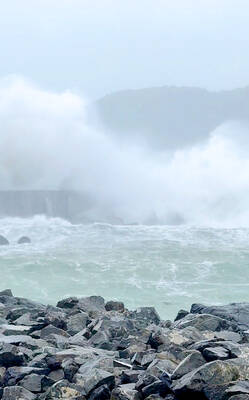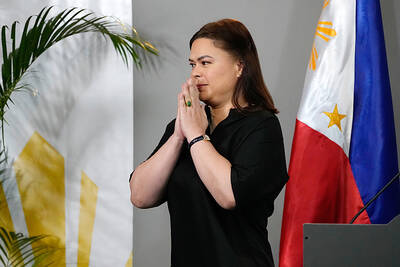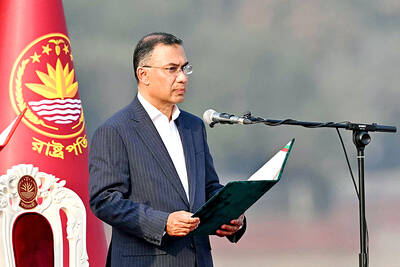Handpicking Iraq's interim leadership to reflect its ethnic and religious makeup seemed like the right thing to do six months ago. But communal tensions are on the rise, deepening the country's ethnic and religious fault lines and casting doubt on prospects for installing a peacefully elected government next year.
While Iraqis revel in their newfound freedoms to speak, worship, publish and broadcast as they please, their future as a unified state is being tested by rivalries among Sunni Muslims, Shiites and Kurds jockeying for power after the overthrow of Saddam Hussein.
Cobbled together by colonial Britain less than a century ago, Iraq has struggled for years with ethnic and religious rivalries.
The prospect of national dismem-berment may seem remote, but that possibility has been enough for Saudi Arabia, Syria and Turkey to warn publicly against steps which might lead to the division of this nation of 25 million. Clashes between majority Shiites and minority Sunnis are not uncommon. On Dec. 9, a Sunni mosque was bombed in Baghdad, killing three people. On Friday, a car bomb killed five people outside a Shiite mosque in Baqouba, a mixed Sunni-Shiite city in a mostly Sunni region.
Attacks on the offices of Kurdish political parties also are increasing, as is squabbling among members of the Governing Council -- the Iraqi interim administration of 13 Shiites, five Sunni Arabs, five Kurds, one ethnic Turk and one Christian -- over whether to adopt a federal system in which the Kurds would retain the substantial self-rule they have enjoyed in their northern provinces since the end of the 1991 Gulf War.
Iraqi politicians routinely explain away their differences as part of the country's newfound democracy and assure Iraqis that only dialogue, rather than violence, would be used to settle differences.
They accuse hard-liners and the media, especially Arab satellite news channels such as Al-Jazeera, of fomenting strife.
"There is no such thing as a 'representative' of Sunni Arabs," said Samir Shakir Mahmoud, a Sunni, when asked about his role on the Governing Council.
"I consider myself an Iraqi citizen first ... and I try to serve Iraqis, all Iraqis -- Sunnis, Shiites, Arabs, Kurds and others," he said in a newspaper interview this week.
But for Sunnis, the prospect of minority status in a future, Shiite-dominated government is unsettling, given their long ascendancy under the British and then under Saddam. Many Sunnis accuse the Americans of fanning sectarianism as part of a divide-and-rule policy. They complain that the Americans are paying excessive attention to the views of senior Shiite clerics on the political process, which is designed to hand over sovereignty to Iraqis by July 1 and put a democratically elected government in place by the end of 2005.
On the other hand, when it comes to resisting Kurdish autonomy demands, Sunni and Shiite Arabs on the council are united.
The patchwork face of post-Saddam Iraq is on vivid display. Iraqi TV broadcasts of the five daily Muslim calls for prayer include both the Sunni and Shiite versions. The Muslim Eid al-Fitr holiday in November was observed on three different days to accommodate all faiths, and the Governing Council runs three religious affairs departments -- one for Shiites, one for Sunnis and one for non-Muslims.
Fair enough, an ecumenical-minded outsider might conclude. Wrong, argue many Iraqis, mostly Sunnis but also some secular-minded Shiites, who see the seeds of secession in the new Iraq.
"The sectarian and religious approach to politics in Iraq is very dangerous," warned Fahmi Howei-di, a prominent Islamic writer from Egypt who closely monitors religious issues in the Arab world.
"It has created a divide that will be difficult to mend or reverse in the future," Howeidi said.

Heavy rain and strong winds yesterday disrupted flights, trains and ferries, forcing the closure of roads across large parts of New Zealand’s North Island, while snapping power links to tens of thousands. Domestic media reported a few flights had resumed operating by afternoon from the airport in Wellington, the capital, although cancelations were still widespread after airport authorities said most morning flights were disrupted. Air New Zealand said it hoped to resume services when conditions ease later yesterday, after it paused operations at Wellington, Napier and Palmerston North airports. Online images showed flooded semi-rural neighborhoods, inundated homes, trees fallen on vehicles and collapsed

‘COST OF DEFECTION’: Duterte’s announcement could be an effort to keep allies in line with the promise of a return to power amid political uncertainty, an analyst said Philippine Vice President Sara Duterte yesterday announced she would run for president of the Southeast Asian nation of 116 million in 2028. Duterte, who is embroiled in a bitter feud with Philippine President Ferdinand Marcos Jr, was impeached last year only to see the country’s Supreme Court throw the case out over procedural issues. Her announcement comes just days before her father, former Philippine president Rodrigo Duterte, begins a pretrial hearing at the International Criminal Court (ICC) in the Netherlands over crimes against humanity allegedly committed as part of a brutal crackdown on drugs. “I offer my life, my strength and my future

NOT YET THERE: While the show was impressive, it failed to demonstrate their ability to move in unstructured environments, such as a factory floor, an expert said Dancing humanoid robots on Monday took center stage during the annual China Media Group’s Spring Festival Gala, China’s most-watched official television broadcast. They lunged and backflipped (landing on their knees), they spun around and jumped. Not one fell over. The display was impressive, but if robots can now dance and perform martial arts, what else can they do? Experts have mixed opinions, with some saying the robots had limitations and that the display should be viewed through a lens of state propaganda. Developed by several Chinese robotics firms, the robots performed a range of intricate stunts, including martial arts, comedy sketches and choreographed

POST-UPRISING: Bangladesh Nationalist Party lawmakers were yesterday expected to formally elect Tarique Rahman as their leader and new head of government Bangladesh’s prime minister-to-be Tarique Rahman and lawmakers were yesterday sworn into parliament, becoming the first elected representatives since a deadly 2024 uprising. Rahman is set to take over from an interim government that has steered the country of 170 million people for 18 months since the autocratic government of Sheikh Hasina was overthrown. The lawmakers, who promised loyalty to Bangladesh, were sworn in by Chief Election Commissioner AMM Nasir Uddin. Bangladesh Nationalist Party (BNP) lawmakers are expected to formally elect Rahman as their leader, with President Mohammed Shahabuddin then to administer the oath of office to the prime minister and his ministers